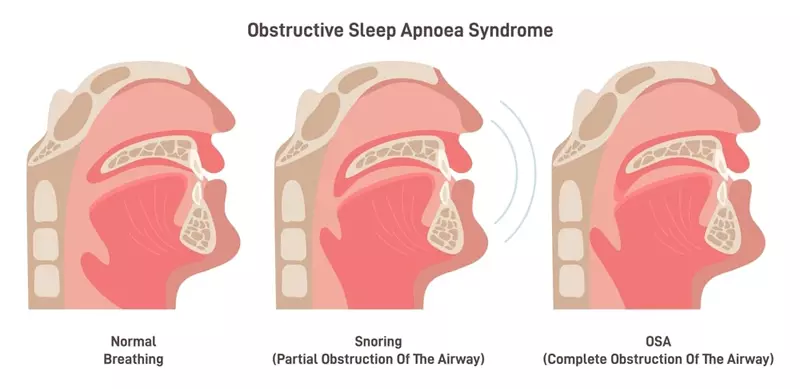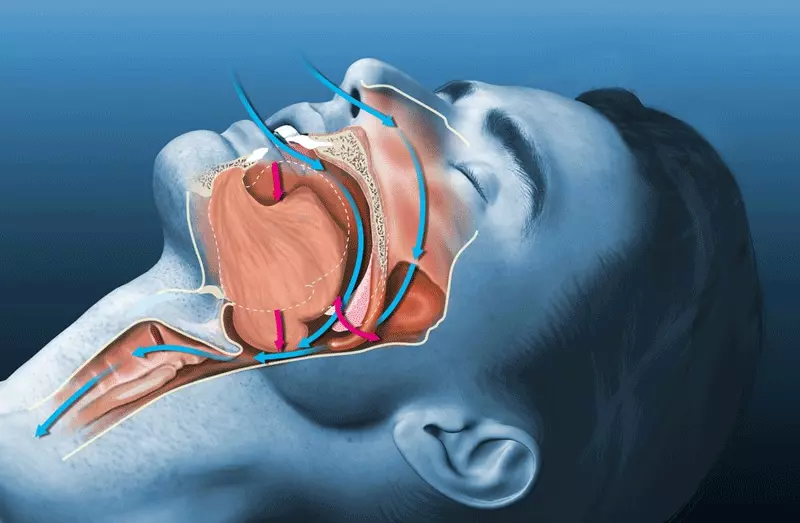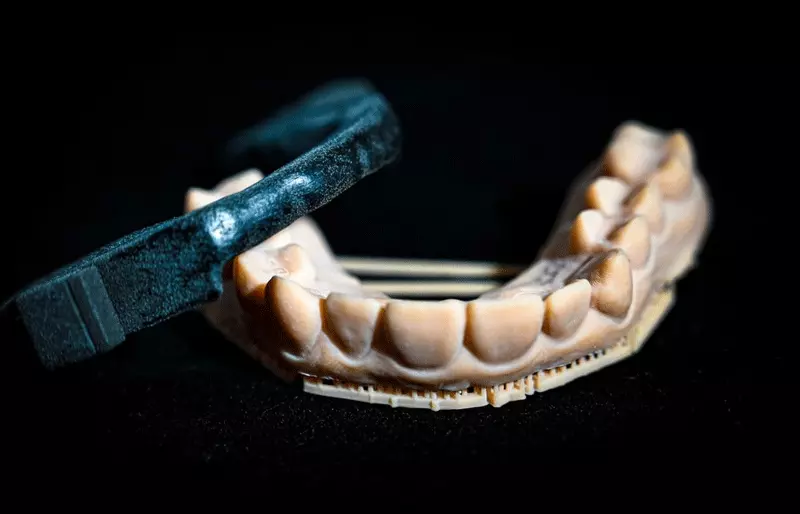Do Mouthguards Help with Snoring? Here's What You Need to Know
Aug 20th 2023

If you often sound like a freight train at night or know someone who does, you're probably familiar with the sleep-disrupting annoyance of snoring. But did you know it can also indicate serious health conditions, like Obstructive Sleep Apnea (OSA)? Thankfully, medical breakthroughs have led to simple, non-invasive solutions - one of which is wearing a mouthguard when you sleep. But do mouthguards help with snoring, or are they just a placebo effect? Combating common myths and misconceptions, we deeply dive into the science behind this prevalent issue and reveal whether mouthguards are effective against the daunting noise monsters that hijack your peaceful slumbers.
A custom-made mouthguard can often help reduce snoring by pulling the lower jaw forward and keeping the airway open. However, it's important to consult with a dentist to determine if this is the right solution for you, as over-the-counter options may not be effective and could even worsen the problem. Additionally, there are various types of mouthguards available based on individual needs, such as Tongue Stabilizing Devices (TSDs) and Mandibular Advancement Devices (MADs), so it's important to find the right fit for your specific situation.
What Causes Snoring?

Snoring is a common sleep disorder affecting millions worldwide. It occurs when there is an obstruction or restriction in airflow through the nose and throat during sleep. Understanding the causes of snoring is essential in finding effective solutions to alleviate this disruptive condition.
Several factors contribute to snoring. One prominent cause is the relaxation of the muscles in the throat and tongue during sleep. As these muscles relax, they can narrow or partially block the airway, leading to turbulent airflow and the characteristic vibrating sound we associate with snoring.
Imagine your throat as a collapsible tube; when you breathe in, it expands to allow air to flow freely. However, when you sleep, the muscles in your throat become more relaxed, causing the tube to collapse partially. This narrowed passage increases resistance to airflow, resulting in snoring.
Other factors contributing to snoring include excess weight, nasal congestion or obstruction, alcohol consumption before bedtime, certain sleeping positions, and anatomical abnormalities such as a deviated septum or enlarged tonsils.
It’s important to note that snoring can also indicate underlying medical conditions such as sleep apnea, a serious sleep disorder where breathing repeatedly stops and starts during sleep. If you or your partner experience loud and frequent snoring accompanied by pauses in breathing or gasping for breath during sleep, it is crucial to seek medical evaluation.
Now that we have discussed the various causes of snoring let’s focus on understanding the role of jaw muscles in contributing to this nighttime nuisance.
- Snoring is a common sleep disorder caused by obstructed airflow through the nose and throat during sleep. Causes include relaxation of throat muscles, excess weight, nasal congestion, alcohol consumption, certain sleeping positions, and anatomical abnormalities. Snoring can also be a symptom of underlying medical conditions like sleep apnea, which requires medical evaluation. Understanding the role of jaw muscles in snoring can help identify effective solutions to alleviate this disruptive condition.
Role of Jaw Muscles in Snoring

The position and activity of the jaw muscles play a significant role in snoring. When the jaw muscles are relaxed during sleep, particularly the tensor veli palatine muscle (which controls the opening and closing of the Eustachian tube) and other muscles supporting the soft palate and tongue, it can contribute to airway obstruction and exacerbate snoring.
As we sleep, the muscles in our body naturally relax, including those in our jaw. When the jaw muscles become too relaxed, the lower jaw may drop backward, causing the tongue to fall back into the throat. This can further restrict the airway and impede smooth breathing, leading to snoring.
To better understand this mechanism, think of your lower jaw as a hinge that holds your mouth closed during waking hours. However, when you sleep, and the muscles relax, the hinge loosens up, allowing the mouth to open slightly and altering the position of your tongue and soft tissues in the throat.
To address this issue, dental devices called mandibular advancement devices (MADs) are often used. These oral appliances help reposition the lower jaw slightly during sleep, which helps keep the airway open by preventing the tongue and surrounding tissues from collapsing into the throat. By reducing or eliminating this obstruction, MADs can aid in reducing snoring episodes.
It is important to note that while MADs can be effective for many individuals with snoring issues, they may not suit everyone. Consulting with a sleep specialist or dentist who specializes in sleep-related disorders can help determine if a MAD is a suitable option for you.
Consider MADs as small hinges that hold your jaw in a more optimal position during sleep, just like how braces align teeth to improve their function gradually.
Impact of Tongue and Soft Palate Position
Regarding snoring, the tongue and soft palate position is crucial in obstructing the airflow during sleep. Understanding how these structures contribute to snoring can shed light on mouthguards' effectiveness in addressing this issue.
The tongue is an important muscle that rests at the base of the mouth. During sleep, some individuals experience a relaxation of the tongue muscles, causing them to fall back and partially block the airway. This obstruction results in vibrations as air tries to pass through, leading to the characteristic sound of snoring.
Similarly, the soft palate, located at the back of the roof of the mouth, can also contribute to snoring. When the muscles in this area relax, it can sag and partially block airflow, further exacerbating snoring.
Now that we better understand how tongue and soft palate positions affect snoring, let's explore how mouthguards come into play in addressing this issue.
- According to a clinical study published in the American Journal of Respiratory and Critical Care Medicine, 34% of patients using Mandibular Advancement Devices (MADs), a type of custom mouthguard, experienced more than 50% reduction in snoring intensity.
- Research from the British Snoring & Sleep Apnoea Association suggests that oral devices like mouthguards effectively treat snoring in up to 80% of cases.
- In a meta-analysis published in Sleep Medicine Reviews, MADs demonstrated a significant reduction in sleep apnea indices as well as substantially lowered the frequency of snoring events for patients, suggesting these devices can provide some relief for both disorders.
The Role of Mouthguards in Snoring

Mouthguards, specifically designed for snoring relief, serve two primary purposes: repositioning the jaw and advancing the tongue. By doing so, they aim to open the airway and reduce or eliminate snoring.
One type of mouthguard commonly used for snoring is known as a Tongue Stabilizing Device (TSD). TSDs work by holding the tongue forward during sleep, preventing it from blocking or obstructing the airway. This device can be particularly helpful for individuals whose primary cause of snoring is related to tongue position.
Another type of mouthguard used for snoring is called a Mandibular Advancement Device (MAD). MADs function by gently pushing the lower jaw forward while keeping it slightly apart from the upper jaw. This forward movement helps create more space at the back of the throat, preventing the soft palate from collapsing and reducing snoring.
For instance, imagine John, who has been struggling with chronic snoring. He decides to try a TSD mouthguard recommended by his sleep specialist. The device holds his tongue forward throughout the night, allowing air to flow more freely and mitigating his snoring. John wakes up feeling refreshed, and even his partner notices a significant decrease in disruptive snoring sounds.
While mouthguards can effectively reduce or eliminate snoring, it's important to note that they may not work for everyone. The effectiveness of mouthguards depends on various factors, such as the individual’s specific anatomical features and the underlying cause of their snoring. It's always best to consult with a sleep specialist or dentist experienced in managing snoring issues to determine which type of mouthguard might be most suitable for each case.
Now that we’ve explored the role of mouthguards in addressing snoring let’s delve into different types of anti-snoring mouthguards available on the market.
Types of Anti-Snoring Mouthguards
If the disruptive noise of snoring has plagued you or your partner, you might be looking for a solution to bring peaceful nights back into your lives. One popular option to consider is an anti-snoring mouthguard. These devices help alleviate snoring by keeping the airway open and preventing obstructions during sleep. There are different types of anti-snoring mouthguards available, each with its own mechanism to address snoring.
Let’s explore two common types of anti-snoring mouthguards: tongue stabilizing devices (TSDs) and mandibular advancement devices (MADs).
Tongue Stabilizing Devices
- What are TSDs?As the name suggests, Tongue stabilizing devices aim to keep the tongue from falling back and blocking the airway during sleep. They typically consist of a small suction cup-like device that attaches to the tip of the tongue, holding it forward and preventing it from obstructing the throat.
- How do they work? By keeping the tongue forward, TSDs create more space in the throat for air to flow freely, reducing or eliminating snoring sounds. These devices are often recommended for individuals with snoring issues specifically related to the base of their tongues.
- Advantages: TSDs tend to be less intrusive compared to MADs, making them suitable for people who may find MADs uncomfortable or have dental concerns. They are also relatively simple and easy to use; no customization is required.
- Considerations: However, it's important to note that TSDs may not be as effective for everyone. Some individuals may find them uncomfortable or experience difficulty in keeping them in place throughout the night. Additionally, those with tongue-related breathing conditions such as sleep apnea should consult with a healthcare professional before using a TSD.
Tongue stabilizing devices can be a viable option for individuals looking for a less invasive and straightforward approach to addressing snoring caused by the tongue's position during sleep. However, if a TSD doesn't seem like the right fit, another type of anti-snoring mouthguard that might be worth exploring is the mandibular advancement device (MAD).
Mandibular Advancement Devices

Snoring can disrupt your sleep and your partner’s. It occurs when the tissues in your throat relax and vibrate, causing those familiar disruptive sounds. One popular option to alleviate snoring is the use of mandibular advancement devices (MADs). These mouthguards reposition the lower jaw slightly, helping open the airway and reduce snoring.
MADs are designed to be worn during sleep, providing snorers with a comfortable yet effective solution. They are typically custom-made or adjustable to ensure a proper fit and alignment of the jaw. By advancing the lower jaw, these devices help prevent the collapse of soft tissues at the back of the throat, reducing snoring and improving airflow. When considering MADs, choosing one that suits your specific needs and preferences is important.
Jim, struggling with chronic snoring, decided to try a mandibular advancement device after hearing about its potential benefits. He visited his dentist, who recommended a custom-made MAD tailored to fit his mouth precisely. After a brief consultation and dental impressions, Jim received his personalized MAD. He found it easy to wear and experienced a noticeable improvement in his snoring within days.
Now that we understand how MADs work in reducing snoring let’s explore another important aspect: consultation and custom-made mouthguards.
Consultation and Custom-Made Mouthguards
If you’re considering using a mouthguard or MAD for snoring, it's crucial to consult with a healthcare professional or dentist specializing in sleep medicine. A consultation will help determine if a mandibular advancement device is suitable for you based on factors such as the severity of your snoring and any underlying contributing conditions.
During the consultation, the healthcare professional will assess your medical history, physically examine your mouth and throat, and discuss your symptoms and sleep patterns. They might also recommend a sleep study or refer you to a specialist for further evaluation.
Once it’s determined that a MAD is appropriate for you, the next step involves getting a custom-made mouthguard. This process typically involves taking dental impressions of your upper and lower teeth, which are then used to fabricate a personalized MAD that fits securely and comfortably in your mouth.
Custom-made mouthguards offer several advantages over generic ones. Firstly, they provide a precise fit tailored to your unique bite and jaw position, ensuring optimal effectiveness. Secondly, they are more comfortable to wear because they are designed for you. Lastly, they are usually made from durable materials that can withstand nightly use.
Sarah addressed her snoring problem by consulting a sleep dentist. After thoroughly examining and discussing her symptoms, the dentist recommended a custom-made mouthguard. Sarah underwent the process of having dental impressions taken and eagerly awaited her personalized device. When she received it, she marveled at how well it fit and how comfortable it was compared to previous generic mouthguards she had tried.
Now that we’ve explored the significance of consultation and custom-made mouthguards when addressing snoring, let’s delve into other options that may suit different preferences and needs.
Can anyone use a mouthguard for snoring, or are there specific requirements or conditions that need to be met?
Generally, anyone who snores can use a mouthguard. However, specific requirements or conditions may need to be met for optimal results. For instance, individuals with severe sleep apnea or certain dental issues may require a customized mouthguard. It is recommended to consult a healthcare professional or dentist to determine the most suitable option based on individual needs. According to a study published in the Journal of Clinical Sleep Medicine, 79% of participants reported reduced snoring intensity when using a mandibular advancement device (MAD), a type of mouthguard specifically designed for snoring.
How do mouthguards work in reducing or eliminating snoring?
Mouthguards work in reducing or eliminating snoring by repositioning the jaw and tongue, allowing for a more open airway while sleeping. By keeping the airway unobstructed, mouthguards help prevent the vibrations and blockages that cause snoring. According to a study published in the American Journal of Respiratory and Critical Care Medicine, using a mandibular advancement device, which is a type of mouthguard, resulted in a significant reduction in snoring intensity and frequency for individuals with mild to moderate sleep apnea.
How effective are mouthguards treating snoring compared to other methods, such as CPAP machines or surgery?
Mouthguards can effectively treat snoring, especially for mild to moderate cases. They work by repositioning the jaw and tongue to maintain an open airway. However, compared to CPAP machines, which provide continuous positive air pressure, mouthguards may be less effective for severe cases of sleep apnea. Conversely, surgery is a more invasive option that involves altering the anatomy of the throat and is typically reserved for severe cases when other treatments have failed. Overall, the choice between mouthguards, CPAP machines, or surgery depends on the severity of snoring and individual preferences.
What are the potential side effects or risks of using a mouthguard for snoring?
The potential side effects of using a mouthguard for snoring are generally minor and temporary. Some users may initially experience slight discomfort, soreness in the jaw, or excessive salivation. However, these issues usually diminish as the individual gets used to wearing the mouthguard. Additionally, there is a small risk of experiencing a change in tooth alignment over time, although this is rare. According to a study published in the Journal of Sleep Research, out of 200 participants who used mouthguards for snoring for six months, only 5 reported changes in their tooth alignment. Overall, the benefits of using a mouthguard for snoring outweigh the potential risks or side effects.
Are there different types of mouthguards for snoring, and how do they differ?
Yes, there are different types of mouthguards for snoring, each designed to suit individual needs. The two main types are mandibular advancement devices (MADs) and tongue-retaining devices (TRDs). MADs work by repositioning the jaw to open the airways, while TRDs hold the tongue to prevent it from obstructing the throat. Studies have shown that MADs are more effective in reducing snoring and improving sleep quality than TRDs, with success rates ranging from 70-90%. It's important to consult a healthcare professional to determine which type of mouthguard is most suitable for you.
